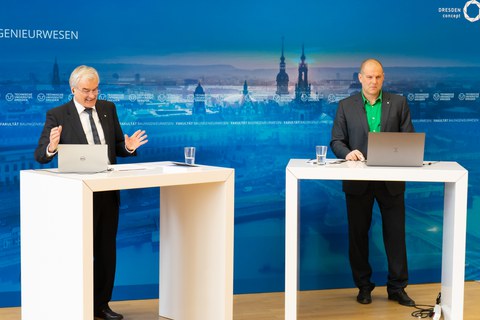Mar 18, 2021
The 44th Dresden Hydraulic Engineering Colloquium - for the first time as a digital event

Prof. Dr.-Ing. Jürgen Stamm, head of the Institute of Hydraulic Engineering and Technical Hydromechanics, opens the event in front of the camera.
Traditionally, the Hydraulic Engineering Colloquium in March opens a whole series of annually recurring major events and congresses at the Faculty of Civil Engineering of the TU Dresden. The colloquium with lecture blocks and accompanying trade fair usually takes place in the Dresden International Congress Center. With up to 500 participants it has a high relevance, far beyond the Free State of Saxony. While last year's event could just take place before all major conferences were cancelled due to the pandemic, it was clear early on for this year's event that it would have to be brought into a completely new, fully digital format for the first time.

At the "headquarters" of the colloquium: Prof. Stamm and Dr. Heyer open the digital event.
Online conferences cannot replace personal exchange on site, yet they also offer advantages. Parts of this year's innovations could last for the future; for example, all presentations remain available online for 14 days after the end of the event, and parallel sessions can be attended subsequently.
And the omission of travel for participants in the context of many climate change impacts, makes a good connection to this year's conference theme:
"Hydraulic Engineering between Floods and Water Shortages."
Climate change is also leading to an increased occurrence of extreme events such as floods, heavy rainfall and drought in Germany. In the last two decades, flood events in particular have received a great deal of attention, but increasingly the longer-term effects of water shortages are becoming noticeable, which are now putting a wide variety of systems under significant stress.
And so this year's technical presentations demonstrated very nicely that both water management and navigation are already working intensively to adapt and cope with the consequences of climate change. Water permeates all spheres of life and therefore the degree to which it is affected is particularly high.
The following core needs can be derived from the numerous presentations and contributions to the discussion:
- reliable digital information systems, forecasts - predictions but also scenarios
- intelligent management strategies for dam reservoirs (safe drinking water supply in quantity and quality, water level increase, flood retention)
- intelligent strategies for water-related uses
- more resilience to extreme hydrological events
- openness to new approaches and ideas, including in the field of hydropower against the background of the European Green Deal
- intensive and lively participation in discussions by everyone in our society.
